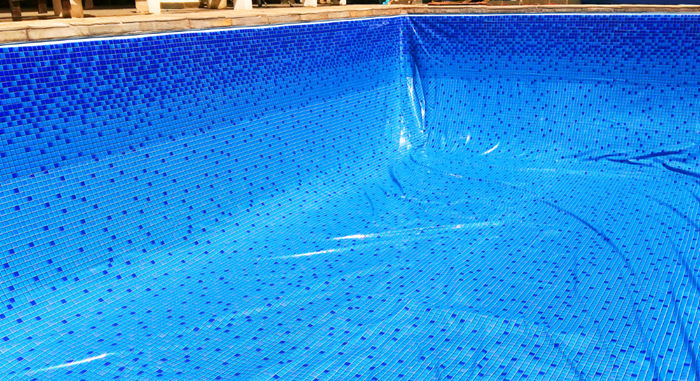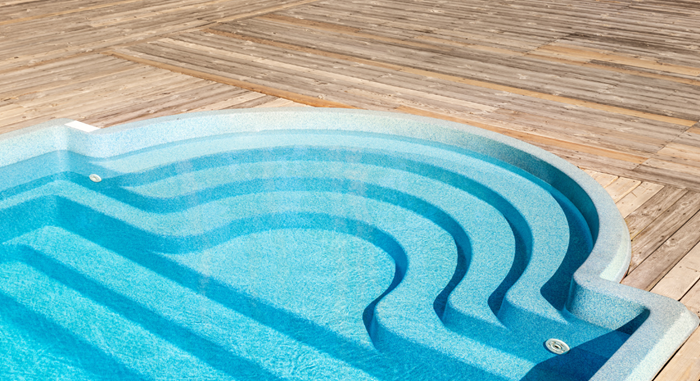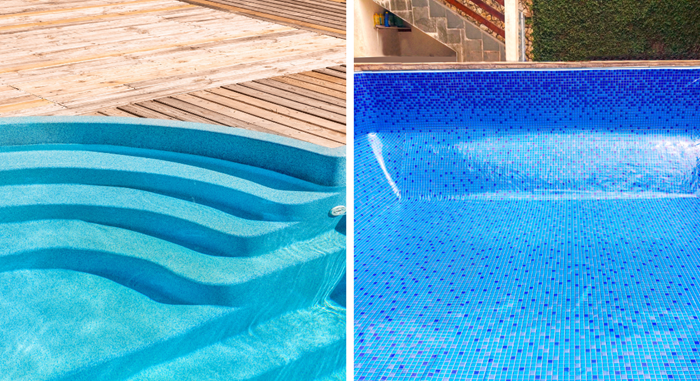When it comes to installing a swimming pool, choosing the right type can be a daunting task. Among the myriad options available, two popular choices stand out: vinyl liner pools and fiberglass pools. Each option comes with its own set of advantages and disadvantages, making the decision-making process even more challenging. In this article, we’ll delve into the key differences between vinyl liner and fiberglass pools, helping you make an informed choice for your backyard oasis.
Understanding Vinyl Liner Pools
Construction and Feature
Vinyl liner pools are constructed with a custom-made vinyl liner that acts as the interior surface of the pool. These inground swimming pools are typically built by digging a hole, installing a framework, and then fitting the vinyl liner into place. One of the primary advantages of vinyl liner pools is their relatively lower initial cost compared to other types of pools like concrete or fiberglass. Additionally, vinyl liners come in a variety of colors and patterns, allowing for customization to suit your aesthetic preferences.
Advantages and Disadvantages
Vinyl liner pools offer lower initial costs but may require replacement every 7 to 15 years, depending on factors such as usage and maintenance. This can incur additional lifetime costs and inconvenience for the pool owner. Furthermore, vinyl liners are susceptible to punctures and tears, which can occur from sharp objects or improper maintenance techniques. Existing vinyl liners can also be refurbished with a gel coating to extend their lifespan and refresh their appearance. This option provides a cost-effective alternative to complete liner replacement for homeowners looking to rejuvenate their pool surface.

Exploring Fiberglass Pools
Installation and Characteristics
Fiberglass pools are essentially pre-manufactured shells that are installed in one piece at the construction site. These pools offer a smooth, non-porous surface that is resistant to algae growth and staining. One of the main advantages of fiberglass pools is their durability and low maintenance requirements. Unlike vinyl liners, fiberglass shells do not require replacement, saving both time and money in the long run. Additionally, fiberglass pools come in a variety of shapes and sizes, allowing for greater flexibility in design. They are also quick to install, with the entire process taking as little as a few days to complete.
Cost and Maintenance
Fiberglass pools may have a higher initial cost compared to vinyl liner pools, but they offer lower long-term maintenance expenses. With no need for liner replacement and minimal upkeep requirements, fiberglass pools can provide cost savings in the years following installation. Fiberglass pools also resist punctures, fading, and staining, ensuring years of trouble-free enjoyment for homeowners. Proper water chemistry is crucial to maintaining the pristine condition of fiberglass pools, further reducing long-term costs.

Comparing Vinyl Liner and Fiberglass Pools
Initial Cost and Longevity
When deciding between a vinyl liner and fiberglass pool, one of the primary considerations is the initial cost. Vinyl liner pools generally have a lower upfront cost, making them more accessible to budget-conscious homeowners. However, it’s essential to consider the long-term expenses, including maintenance and potential liner replacement, which can add up over time. On the other hand, fiberglass pools may have a higher initial cost, but they offer lower long-term maintenance expenses and greater durability.
Customization and Design Options
Vinyl liner pools offer a wide range of customization options, with various colors, patterns, and designs available to suit your preferences. However, fiberglass pools are limited in terms of customization, as they come in pre-manufactured shapes and sizes. While this may restrict design flexibility for some homeowners, fiberglass pools still offer a sleek and modern aesthetic that can complement any backyard space.
For homeowners interested in tanning ledges or other built-in features, both vinyl liner and fiberglass pools can accommodate these additions. However, customization options may vary depending on the pool type and manufacturer.
Fiberglass or Vinyl Pool: Making the Right Choice
Ultimately, the decision between a vinyl liner and fiberglass pool depends on your budget, aesthetic preferences, and long-term maintenance goals. If you’re looking for a cost-effective option with ample design flexibility, a vinyl liner pool may be the right choice for you. However, if durability, low maintenance, and long-term savings are your top priorities, a fiberglass pool could be the ideal solution for your backyard oasis.
Key Points to Remember:
- Vinyl liner pools offer lower initial costs but may require replacement every 7 to 15 years.
- Fiberglass pools have higher upfront costs but require minimal maintenance and offer greater durability.
- Consider your budget, maintenance preferences, and design flexibility when choosing between vinyl liner and fiberglass pools.
Sutton Pools: Clarksville Pool Builder
If you’re a Clarksville resident seeking to elevate your backyard into a captivating retreat, look no further than
Sutton Pools. Renowned for our exceptional craftsmanship and personalized approach, Sutton Pools stands as the go-to pool builder in the region. Specializing in crafting bespoke vinyl liner and
fiberglass pools, we cater to the distinct needs and preferences of every client.
From the initial brainstorming session to the final installation, our team of seasoned professionals ensures a smooth and hassle-free experience. With a steadfast dedication to excellence and customer satisfaction, Sutton Pools is poised to be your trusted partner in turning your vision of the perfect pool into a reality.
FAQs
Q. Which is better: a liner pool or fiberglass?
A. The choice between a liner pool and fiberglass pool depends on various factors such as budget, maintenance preferences, and desired aesthetics. Liner pools, typically made of vinyl, offer lower upfront costs and customization options but may require liner replacement every 7 to 15 years. Fiberglass pools, on the other hand, have higher initial costs but require less maintenance in the long run due to their durable surface. Ultimately, the best option varies for each homeowner based on their specific needs and priorities.
Q. What are the disadvantages of a fiberglass pool?
A. While fiberglass pools offer many advantages, they also come with some disadvantages. One drawback is the limited customization options compared to concrete or vinyl liner pools. Fiberglass pools come in pre-made shapes and sizes, which may not suit every homeowner’s preferences. Additionally, fiberglass pools may have higher initial costs compared to vinyl liner pools, although they offer lower long-term maintenance expenses.
Q. Is a vinyl liner pool worth it?
A. Whether a vinyl liner pool is worth it depends on individual preferences and priorities. Vinyl liner pools generally have lower upfront costs and offer a wide range of customization options in terms of colors and patterns. However, they may require more maintenance over time, including liner replacement every 7 to 15 years. Homeowners who prioritize initial cost savings and design flexibility may find vinyl liner pools worth it, while others may prefer the long-term durability and lower maintenance of fiberglass pools.
Q. What is the best material for a pool liner?
A. The best material for a pool liner depends on factors such as durability, maintenance requirements, and design preferences. Vinyl liners are a popular choice for their affordability and customization options, although they may need replacement every decade or so. Fiberglass pools offer durability and low maintenance but come with higher initial costs and limited customization. Concrete pools also provide long-term durability and extensive customization options but involve higher installation costs and longer construction times. Ultimately, the best material for a pool liner varies for each homeowner based on their specific needs and priorities.
Q. How About Gunite Pools?
A. Gunite pools, another popular option, offer durability and highly customizable design possibilities. However, they come with longer installation times and higher upfront costs compared to vinyl liner pools. While gunite pools provide unmatched flexibility in design, they also require more maintenance and can be prone to algae growth if not properly cared for.




